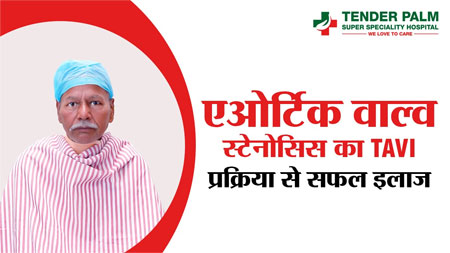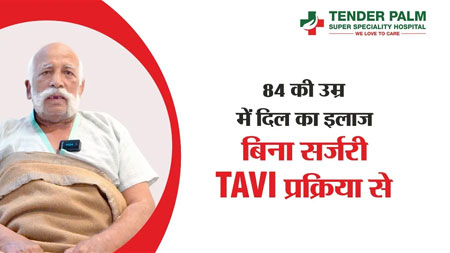What is a TAVI?
TAVI is a medical abbreviation (name) for a transcatheter aortic valve implantation procedure. It improves the blood flow in your heart by replacing an aortic valve that doesn’t open fully.
TAVI can also be called Transcatheter aortic valve replacement (TAVR). There is no difference between TAVI and TAVR – they are just different names for the same procedure. TAVI is more commonly used in the UK, than TAVR in the USA.
TAVI is a common, mostly painless procedure. A narrow flexible tube (called a catheter) is put into a blood vessel in your upper leg or chest and is passed towards your aortic valve in your heart. The tube is used to fix a replacement valve over the top of your old one.
Who is the right candidate for TAVI?
- Patients who have severe aortic stenosis and show symptoms need special attention.
- People who are low, intermediate, or high risk for regular valve replacement surgery should be considered.
- Those with a failing surgical aortic valve need care as well.
- Lastly, individuals who may not be suitable for open-heart surgery due to age or other health issues should not be overlooked.
What preparations are necessary for Transcatheter Aortic Valve Replacement?
The following diagnostic tests are probably going to be performed on you before a transcatheter aortic valve replacement. They consist of:
- Blood examinations.
- Heart-rate chart (EKG).
- A heart magnetic resonance imaging (MRI) or computed tomography (CT) scan.
The left side of your heart is catheterized. This is used by providers to gauge the blood flow throughout your heart. They can also get a sneak peek at any possible issues they would have to address.
Your healthcare professional will discuss with you what to expect both during and after the procedure after these tests. Additionally, they will discuss with you the type of anesthetic you will receive for your TAVR treatment. They can also respond to any other queries you may have.
A transcatheter aortic valve replacement surgery requires you to fast for four to six hours before the procedure. Before your operation, find out from your provider whether you need to stop taking any specific medications and when.
How effective are procedures using TAVI?
After a TAVI operation, most patients report feeling better and being able to do more in their daily life and, fewer people may experience problems. The risk varies according on your specific heart problem as well as your general health.
Making healthy lifestyle choices can lower your risk of TAVI and increase your chances of long-term success. These changes include:
- Consuming healthier food
- Upping your level of physical activity
- Quitting smoking
- Reducing alcohol intake
- Taking medication as directed
- Maintaining healthy gums and teeth is important because this is how bacteria typically enter the bloodstream.
- Getting a dental examination to ensure that your gums and teeth are in good condition and to lower your risk of endocarditis
What is the life expectancy of a TAVI heart valve?
Further research is needed before we can be certain about the average life cycle of TAVI valves. After treatment, the majority of patients' TAVI valves will still function properly six years later. As techniques and technology develop, this ought to improve.
What are TAVI's advantages?
Each person's benefits and dangers from TAVI vary depending on their age, overall health, and the severity of their aortic stenosis. TAVI can have the following advantages:
- Pain relief or reduced discomfort (if you have angina)
- Alleviation of or reduction of dyspnea.
- Reduction or alleviation of fatigue.
- Greater energy and relief from lightheadedness and fainting.
- Your heart pumps blood more efficiently, making daily chores and exercise easier and more pleasurable.
- Enhanced mental well-being and mood
- Lowered chance of passing away and cardiac failure
The following are some advantages of TAVI over open heart aortic valve surgery:
- Fewer fatalities and strokes
- A faster rate of recovery overall and a shorter hospital stay.
What happens during the procedure?
You will either be given general anesthesia (less common) or moderate sedation (more usual) at the start of the surgery. Both involve taking medication to prevent pain, although mild sedation has less of an impact. Additionally, you can breathe normally without a tube in your throat when under moderate sedation (ventilator). A breathing machine is connected to a tube that a medical professional inserts into your throat to give general anesthesia. After the treatment is over, a provider removes the tube.
Additionally, you will be given medication to avoid blood clots.
- A transcatheter aortic valve replacement involves the following steps that an interventional cardiologist will take:
- Create a tiny incision, and then use a catheter to pass a thin tube into your upper thigh's femoral artery. If necessary, they can utilize an alternate access point, however this is the most frequently used one.
- Place the catheter in your chest.
- After inserting the new valve into your old aortic valve, expand it. The replacement valve ought to slide in and remain there. After being pushed aside by the new valve, the old one will remain behind.
- Examine for problems like leakage.
- Take the catheter out of your body.
- Close the opening with a stitch and cover it with gauze.
What should I expect after this procedure?
An anesthesiologist will stop the anesthesia or sedation once the TAVR operation is completed, allowing you to awaken. However, to stop the bleeding, they will keep you in bed for at least a few hours. This is because the catheter's entry location was a large blood vessel, and doctors want to make sure the stitches are in place before you move.
A doctor may give you medication to prevent blood clots or infections following the procedure.
What Patient's Says about TAVI at Tender Palm Hospital
An Elderly patient from Gorakhpur with severe aortic stenosis found new life through TAVI and It performed by Dr. Gautam Swaroop. Avoiding risky open-heart surgery, the patient recovered quickly and was discharged in just two days.Read More
An elderly patient from Uttarakhand, suffering from severe aortic valve stenosis, underwent the advanced TAVI procedure. Within a day, he was walking freely again, regaining his life without the risks of open-heart surgery.
Read More
Why Tender Palm Super-Speciality Hospital for TAVI (Transcatheter aortic valve implant) in Lucknow, India?
Tender Palm Hospital has the most experienced cardiologists & cardiac surgeons in Lucknow, India. We provide advanced cardiac care with modern catheter lab facilities and a caring medical team. Our focus on patients ensures safety, precision, and faster recovery. This makes us one of the best Transcatheter aortic valve implant (TAVI) hospital in Lucknow, India.
To seek an expert consultation for TAVI (Transcatheter aortic valve implant) in Lucknow, India.
Call us at +91-9076972161
Email at care@tenderpalm.com
Our Experts
Awards & Accreditations





